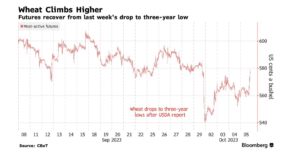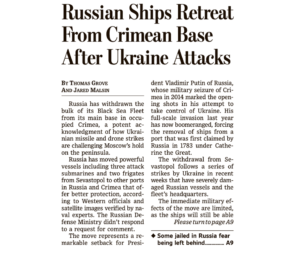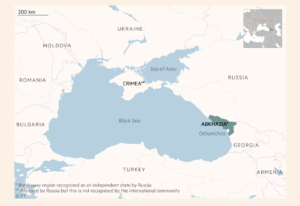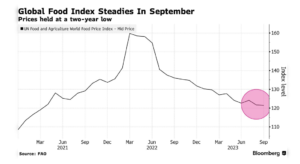President Donald Trump on Friday signed an executive order temporarily expanding the amount of beef the U.S. can import from Argentina, a move the White House says is aimed at…
Wheat Climbs on Black Sea Turmoil, While Global Food Prices Little Changed In September
Dow Jones writer Kirk Maltais reported yesterday that, “Wheat for December delivery rose 3.3% to $5.78 1/4 a bushel on the Chicago Board of Trade on Thursday, with futures climbing in reaction to news throughout the day of Russian attacks on Ukrainian cities, and fears that vessels earmarked for carrying Ukrainian grain could be targeted.”
And today, Bloomberg News reported that, “Russian forces hit a residential area of Kharkiv, Ukraine’s second largest city, with ballistic missiles Friday morning, killing at least two people, including a child and his grandmother, and injuring dozens of others. The hit came less than 24 hours after 52 people were killed when a Russian rocket hit a cafe and grocery store in the village of Hroza near Kupyansk, to Kharkiv’s southeast, in one of the deadliest attacks on civilians in the 20-month-old conflict.”

Today’s article explained that, “Wheat futures rose, extending the week’s rebound from a three-year low, amid signs of renewed demand at current price levels and ongoing jitters about stepped-up Russian attacks on Ukraine. Kyiv this week has attempted restart shipments by sea, despite the collapse of a safe-corridor deal backed by Russia over the summer.”
Also today, Reuters News reported that, “Chicago wheat prices edged lower on Friday but were still set for their biggest weekly rise since June amid fears that dry weather will reduce some harvests and after a ship in the Black Sea struck a mine, threatening Ukrainian grain exports.”
The Reuters article explained that, “A Turkish-flagged general cargo ship hit a mine in the Black Sea and suffered minor damage on Thursday.
“A Ukrainian government source said it was ‘probably a World War II mine or the landing mines that were left there last year,’ but the event came shortly after Britain said Russia may target civilian shipping, including by laying sea mines on the approach to Ukrainian ports.
“The news highlighted the difficulty of exporting from Ukraine by sea, the cheapest and easiest available route.”
More broadly on Black Sea dynamics, Thomas Grove and Jared Malsin reported on the front page of Thursday’s Wall Street Journal that, “Russia has withdrawn the bulk of its Black Sea Fleet from its main base in occupied Crimea, a potent acknowledgment of how Ukrainian missile and drone strikes are challenging Moscow’s hold on the peninsula.”

Grove and Malsin pointed out that, “The withdrawal from Sevastopol follows a series of strikes by Ukraine in recent weeks that have severely damaged Russian vessels and the fleet’s headquarters.
“The immediate military effects of the move are limited, as the ships will still be able to fire cruise missiles on civilian infrastructure such as ports and power grids, naval experts said. Ukraine’s strikes had already broken the fleet’s blockade of Ukrainian ports, denying Russian access to parts of the Black Sea and opening a new corridor for Ukraine to dispatch economically vital grain shipments.”
The Journal article added that, “But the withdrawal is a timely boost for Ukraine.”
In related news, Financial Times writers Max Seddon and Roman Olearchyk reported yesterday that, “Georgia’s breakaway region of Abkhazia has signed a deal with Moscow to establish a permanent naval base on the region’s Black Sea coast, its leader said, as Russia shifts its vessels in the area following Ukrainian missile attacks.”

“Russia’s Black Sea fleet has come under repeated fire in recent weeks from Ukrainian forces, including with UK and French-supplied long-range missiles and with aerial and sea drones,” the FT article said.
Seddon and Olearchyk noted that, “Russian naval vessels patrolling the Black Sea have also been targeted by Ukrainian sea drones, keeping them away from a shipping corridor Ukraine unilaterally launched this summer, which hugs the coast of its Odesa region and southern neighbours Romania and Bulgaria, both members of the Nato military alliance.”
Reuters writer Pavel Polityuk reported today that, “Ukraine’s grain exports are down 27.8% to 6.92 million metric tons so far in the 2023/24 July-June season, compared with 9.63 million tons in the same period of 2022/23, agriculture ministry data showed on Friday.”
While a separate Reuters article today reported that, “Ukraine, a major global grain producer, has harvested 46.7 million metric tons of grain and oilseeds from the new 2023 harvest so far, the agriculture ministry said on Friday.”
Meanwhile, Bloomberg writer Mia Dawkins reported today that, “Global food prices steadied at the lowest in more than two years as improving supplies of oilseeds and some grains countered sugar shortages.

“A gauge of food-commodity costs was little changed in September, the United Nations’ Food and Agriculture Organization said Friday. The slump from a record set in March 2022 should eventually help ease grocery inflation that has been rampant since Russia’s invasion of Ukraine — and there are signs of that already happening in some countries.”
Dow Jones writer Yusuf Khan reported today that, “The UN FAO’s food price index, which tracks global prices for a basket of staple foods, averaged 121.5 points in September, putting prices 24% lower than the March 2022 peak and nearly 11% lower than a year ago.”
Reuters News reported today that, “In a separate report on cereal supply and demand, the FAO forecast world cereal production this year at 2.819 billion tonnes, up slightly from a previous estimate of 2.815 billion and some 0.9% higher than 2022 levels, the FAO said.
“The higher forecast was almost entirely driven by more positive yield estimates for Russia and Ukraine, owing to continued favourable weather conditions, the FAO said.”





